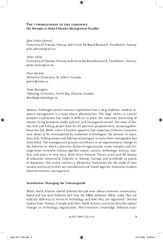The Cyborgization of the Fisheries : on Attempts to Make Fisheries Management Possible
Permanent link
https://hdl.handle.net/10037/2459Date
2009Type
Journal articleTidsskriftartikkel
Peer reviewed
Abstract
Although natural resource exploitation has a long tradition, modern resource management is a more recent phenomenon. The huge variety in natural resource exploitation has made it difficult to place the industrial harvesting of marine living resources under political and managerial control. For most of history fish and fishing people have for all practical purposes been unmanageable.
From the late 1960s, when it became apparent that important fisheries resources were about to be overexploited by industrial technologies, the process to transform
fish, fishing people and fishing technologies to make them manageable has
intensified. The management process contributes to an organizational change in
the fisheries in which cybernetic forms of organization create complex and heterogeneous
networks linking together nature, society, technology, science, markets, and policy in new ways. With Actor-Network Theory (ant) and the history of industrial commercial fisheries in Norway, Canada and worldwide as points of departure, this article outlines a theoretical framework for the study of how
natural and social entities are transformed and linked together to become modern
fisheries resource management.
Publisher
SISWO (The Netherlands Universities' Social Research Centre)Citation
Maritime Studies 7(2009) nr. 2 s. 9-34Metadata
Show full item recordCollections
Related items
Showing items related by title, author, creator and subject.
-
Governance and the study of shrimp revitalization program in Indonesia
Dyspriani, Polite (Master thesis; Mastergradsoppgave, 2007-05-29)Shrimp world production in the last few years has shown very high growth rates. It is marked by an increasing of production volume, and by shifting from capture to aquaculture fisheries within the production system. This has occurred mostly regarding to the brackish water pond. For some years, the government has had to face hard choices in order to ensure shrimp aquaculture developed sustainable. ... -
Levendelagret rødspette (Pleuronectes platessa) – velferd og kvalitet
Pettersen, Ingrid Marie; Aaknes, Vilde Synnøve (Master thesis; Mastergradsoppgave, 2023-05-15)I dag er verdikjeden for fisk og skalldyr bygget opp rundt utnyttelse av et fåtall arter som kan fanges i store volum og med høy markedsverdi. Bruk av lite eller ikke utnyttede marine ressurser kan være en bærekraftig tilnærming for å innfri fremtidige krav og etterspørsel til fiskekonsum. Rødspette (Pleuronectes platessa) er den viktigste flatfisken i volum og verdi i europeiske fiskerier. Både ... -
Boundary construction in mandated science : the case of ICES' advice on fisheries management
Nolde Nielsen, Kåre (Doctoral thesis; Doktorgradsavhandling, 2008-11-21)What is the relationship between science and politics? What should it be? How are their respective roles conceived and acted out in practice? Should science and politics be clearly separated? How? Are there cases in which they can be usefully mixed? What cases are those, and are there some ways of mixing that are better than others? This project explores such questions by examining relationships ...


 English
English norsk
norsk


